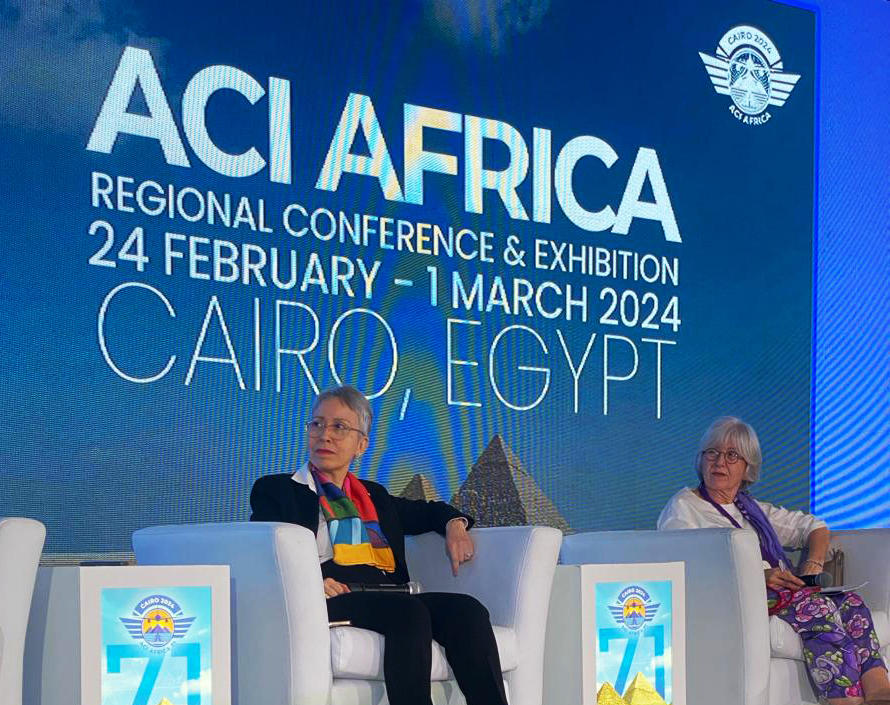27 February 2024 - Morocco adheres fully to the Airports Council International's program for (responsible) carbon emissions reduction

Cairo, 02/27/2024 (MAP) – Morocco fully supports the Airports Council International (ACI) program to reduce carbon emissions from airports, said Habiba LAKLALECH, CEO of the Moroccan Airports Authority (ONDA), in Cairo on Tuesday.
Speaking on the theme of "Adopting a global framework for the implementation of environmental preservation, social development and governance (ESG) principles at airports", as part of the working sessions of the 71st Airports Council International Africa Section (ACI Africa) Regional Conference and Exhibition, Mrs. LAKLALECH pointed out that the Kingdom's major airports are fully committed to adhering to the ACI program aimed at reducing carbon emissions at airports.
Additionally, she mentioned that Casablanca Mohammed V and Marrakech Menara airports had achieved level 2 of the program, whereas Fez-Saïss and Rabat-Salé airports had successfully implemented level 1. Furthermore, ten airports in the Kingdom had been granted the prestigious "ISO 140001" environmental management certification.
ONDA, Mrs. LAKLALECH stressed, is working to achieve higher levels of the ACI program, and is also preparing to adopt sustainable fuel in national airports from 2025, as part of ONDA's contribution to the goal of achieving carbon neutrality in the aviation sector by 2050. She noted that the adoption of ESG principles at airports will enable ONDA to rationalize energy consumption, lower costs, improve customer satisfaction and innovate in airport products, services and operations, noting that it is also a motivating factor for both employees and partners in the airport sector to increase productivity, performance and competitiveness. Mrs. Laklalech further highlighted that despite the economic challenges small airports are currently facing, ONDA succeeded in achieving positive financial results. This was made possible, in part, by an effective general resource allocation system that enabled the Authority raise the funds required for the financing of projects and airport platform modernization.
Mrs. LAKLALECH stated that ONDA is capitalizing on the substantial surge in air traffic, specifically in the wake of the "Open Sky" agreement signed lately by Morocco and the European Union. She further added that the liberalization of the African sky is anticipated to stimulate air traffic expansion and foster socio-economic progress throughout the African continent.
With regard to the adoption of ESG principles by airports in order to benefit from innovative and preferential financing, Mrs. LAKLALECH pointed out that African airports have unique characteristics that must be considered while adopting this global framework.
These specificities include, according to ONDA’s CEO, the fact that aviation traffic at 20% of African airports does not reach 1 million passengers, while more than half of African airports get fewer than 300,000 passengers per year and face structural challenges related to financial sustainability.
Despite this situation, small airports are more respectful of the environment than large airports, due to their low energy consumption, limited noise and waste, except that they do not make a profit and find it difficult to raise funds to finance projects, she stressed.
The Moroccan Airports Authority (ONDA), which manages large and small airports, can share its experience and expertise in this field with other African airports, concluded Mrs. LAKLALECH.
More than 40 exhibitors from pioneering African air service companies, including the Moroccan pavilion, will participate in the Airports Council International-Africa Section exhibition, presenting the public with aviation innovations, products, ideas, and proposals.
The conference, which runs until March 1, discusses the strategic importance of airports as pillars of economic and social development and sustainable development, their role in achieving sustainability in the face of financial challenges, infrastructure development, skill enhancement, and social inclusion, as well as the consolidation of countries' social and economic evolution and long-term commitment to sustainability.
The airports being central to the global economy, the conference also examines the investment in their infrastructures, particularly in the light of governments' inability to cover investment costs to support the expected increase in air traffic, the obstacles encountered, and efforts to meet future air traffic needs in Africa, all while considering the compatibility between new projects, economic sustainability and environmental and social responsibility.
Retour a la liste




